When I run the application and search I got this error
System.InvalidCastException - column contains NULL data
at Oracle.ManagedDataAccess.Client.OracleDataReader.GetDecimal
This is my code DB repository code :
public List<LabResult> Search(string term)
{
return db.LabResults
.Where(a => a.PatientNo.ToString() == term)
.ToList(); // error on this line
}
This is the view markup:
@model IEnumerable<OracleHIS.Models.LabResult>
@{
ViewData["Title"] = "Index";
}
<table class="table">
<thead>
<tr>
<th>
@Html.DisplayNameFor(model => model.PatientNo)
</th>
<th>
@Html.DisplayNameFor(model => model.LabOrderNo)
</th>
<th>
@Html.DisplayNameFor(model => model.PatientNameE)
</th>
<th>
@Html.DisplayNameFor(model => model.LongForiegnDesc)
</th>
<th>
@Html.DisplayNameFor(model => model.ServNumResult)
</th>
</tr>
</thead>
<tbody>
@if (Model != null)
{
foreach (var item in Model)
{
<tr>
<td>
@Html.DisplayFor(modelItem => item.PatientNo)
</td>
<td>
@Html.DisplayFor(modelItem => item.LabOrderNo)
</td>
<td>
@Html.DisplayFor(modelItem => item.PatientNameE)
</td>
<td>
@Html.DisplayFor(modelItem => item.LongForeignDesc)
</td>
<td>
@Html.DisplayFor(modelItem => item.ServNumResult)
</td>
<td>
@Html.ActionLink("Details", "Details", new { /* id=item.PrimaryKey */ }) |
</td>
</tr>
}
}
</tbody>
</table>
And this is the model class:
namespace OracleHIS.Models
{
public partial class LabResult
{
public decimal PatientNo { get; set; }
public decimal LabOrderNo { get; set; }
public string PatientNameE { get; set; } = null!;
public string LongForiegnDesc { get; set; } = null!;
public decimal ServNumResult { get; set; }
}
}
I found this solution
https://stackoverflow.com/questions/26024722/handle-null-values-when-reading-through-oracledatareader
but where I will use the IsDBNull() in my code?
OracleDataReader provides a IsDBNull() method.
this is the Model in DBset context its a VIEW not TABLE include columns from multiple tables :
protected override void OnModelCreating(ModelBuilder modelBuilder)
{
modelBuilder.HasDefaultSchema("TRNGKAASH")
.UseCollation("USING_NLS_COMP");
modelBuilder.Entity<LabResult>(entity =>
{
entity.HasNoKey();
entity.ToView("LAB_RESULTS");
entity.Property(e => e.AbnormalFlag)
.HasColumnType("NUMBER")
.HasColumnName("ABNORMAL_FLAG");
entity.Property(e => e.ApprovingDateG)
.HasColumnType("DATE")
.HasColumnName("APPROVING_DATE_G");
entity.Property(e => e.CancelBy)
.HasMaxLength(8)
.IsUnicode(false)
.HasColumnName("CANCEL_BY");
entity.Property(e => e.CancelDateG)
.HasColumnType("DATE")
.HasColumnName("CANCEL_DATE_G");
entity.Property(e => e.CancelDateH)
.HasMaxLength(8)
.IsUnicode(false)
.HasColumnName("CANCEL_DATE_H");
entity.Property(e => e.CancelReason)
.HasPrecision(6)
.HasColumnName("CANCEL_REASON");
entity.Property(e => e.DateOfBirth)
.HasPrecision(8)
.HasColumnName("DATE_OF_BIRTH");
entity.Property(e => e.EndResult)
.HasPrecision(6)
.HasColumnName("END_RESULT");
entity.Property(e => e.EventNo)
.HasPrecision(4)
.HasColumnName("EVENT_NO");
entity.Property(e => e.GramStain)
.HasMaxLength(3000)
.IsUnicode(false)
.HasColumnName("GRAM_STAIN");
entity.Property(e => e.GroupNo)
.HasPrecision(6)
.HasColumnName("GROUP_NO");
entity.Property(e => e.HeparinFlag)
.HasPrecision(1)
.HasColumnName("HEPARIN_FLAG");
entity.Property(e => e.HospitalNo)
.HasMaxLength(10)
.IsUnicode(false)
.HasColumnName("HOSPITAL_NO");
entity.Property(e => e.InitDiagnisis)
.HasMaxLength(300)
.IsUnicode(false)
.HasColumnName("INIT_DIAGNISIS");
entity.Property(e => e.LabNo)
.HasPrecision(6)
.HasColumnName("LAB_NO");
entity.Property(e => e.LabOrderNo)
.HasPrecision(12)
.HasColumnName("LAB_ORDER_NO");
entity.Property(e => e.LastUpdateDate)
.HasColumnType("DATE")
.HasColumnName("LAST_UPDATE_DATE");
entity.Property(e => e.LastUpdateTransaction)
.HasMaxLength(1)
.IsUnicode(false)
.HasColumnName("LAST_UPDATE_TRANSACTION");
entity.Property(e => e.LastUpdateUser)
.HasMaxLength(8)
.IsUnicode(false)
.HasColumnName("LAST_UPDATE_USER");
entity.Property(e => e.LongForiegnDesc)
.HasMaxLength(40)
.IsUnicode(false)
.HasColumnName("LONG_FORIEGN_DESC");
entity.Property(e => e.MachineId)
.HasColumnType("NUMBER")
.HasColumnName("MACHINE_ID");
entity.Property(e => e.MedicalCheck)
.HasPrecision(1)
.HasColumnName("MEDICAL_CHECK");
entity.Property(e => e.MrMerge)
.HasPrecision(12)
.HasColumnName("MR_MERGE");
entity.Property(e => e.Nationality)
.HasPrecision(6)
.HasColumnName("NATIONALITY");
entity.Property(e => e.PanicFlag)
.HasColumnType("NUMBER")
.HasColumnName("PANIC_FLAG");
entity.Property(e => e.PatientCategory)
.HasPrecision(6)
.HasColumnName("PATIENT_CATEGORY");
entity.Property(e => e.PatientHospital)
.HasMaxLength(10)
.IsUnicode(false)
.HasColumnName("PATIENT_HOSPITAL");
entity.Property(e => e.PatientNameA)
.HasMaxLength(150)
.IsUnicode(false)
.HasColumnName("PATIENT_NAME_A");
entity.Property(e => e.PatientNameE)
.HasMaxLength(150)
.IsUnicode(false)
.HasColumnName("PATIENT_NAME_E");
entity.Property(e => e.PatientNo)
.HasPrecision(12)
.HasColumnName("PATIENT_NO");
entity.Property(e => e.PatientSourceInd)
.HasPrecision(6)
.HasColumnName("PATIENT_SOURCE_IND");
entity.Property(e => e.PrioFlag)
.HasPrecision(6)
.HasColumnName("PRIO_FLAG");
entity.Property(e => e.ProvidingResource)
.HasPrecision(6)
.HasColumnName("PROVIDING_RESOURCE");
entity.Property(e => e.Reason)
.HasMaxLength(300)
.IsUnicode(false)
.HasColumnName("REASON");
entity.Property(e => e.RefSourceNo)
.HasMaxLength(10)
.IsUnicode(false)
.HasColumnName("REF_SOURCE_NO");
entity.Property(e => e.RefType)
.HasPrecision(6)
.HasColumnName("REF_TYPE");
entity.Property(e => e.ResultNotes)
.IsUnicode(false)
.HasColumnName("RESULT_NOTES");
entity.Property(e => e.SampleCollectedBy)
.HasPrecision(5)
.HasColumnName("SAMPLE_COLLECTED_BY");
entity.Property(e => e.SampleCollectedDateG)
.HasColumnType("DATE")
.HasColumnName("SAMPLE_COLLECTED_DATE_G");
entity.Property(e => e.SampleCollectedDateH)
.HasMaxLength(8)
.IsUnicode(false)
.HasColumnName("SAMPLE_COLLECTED_DATE_H");
entity.Property(e => e.SampleNo)
.HasPrecision(12)
.HasColumnName("SAMPLE_NO");
entity.Property(e => e.SampleNote)
.HasMaxLength(300)
.IsUnicode(false)
.HasColumnName("SAMPLE_NOTE");
entity.Property(e => e.SampleReceivedDateG)
.HasColumnType("DATE")
.HasColumnName("SAMPLE_RECEIVED_DATE_G");
entity.Property(e => e.SampleReceivedDateH)
.HasMaxLength(8)
.IsUnicode(false)
.HasColumnName("SAMPLE_RECEIVED_DATE_H");
entity.Property(e => e.SampleRecievedBy)
.HasMaxLength(8)
.IsUnicode(false)
.HasColumnName("SAMPLE_RECIEVED_BY");
entity.Property(e => e.SampleType)
.HasPrecision(6)
.HasColumnName("SAMPLE_TYPE");
entity.Property(e => e.ServCancelBy)
.HasMaxLength(8)
.IsUnicode(false)
.HasColumnName("SERV_CANCEL_BY");
entity.Property(e => e.ServCancelDateG)
.HasColumnType("DATE")
.HasColumnName("SERV_CANCEL_DATE_G");
entity.Property(e => e.ServCancelDateH)
.HasMaxLength(8)
.IsUnicode(false)
.HasColumnName("SERV_CANCEL_DATE_H");
entity.Property(e => e.ServCancelReason)
.HasColumnType("NUMBER")
.HasColumnName("SERV_CANCEL_REASON");
entity.Property(e => e.ServNo)
.HasPrecision(6)
.HasColumnName("SERV_NO");
entity.Property(e => e.ServNumResult)
.HasColumnType("NUMBER")
.HasColumnName("SERV_NUM_RESULT");
entity.Property(e => e.ServRequestDateG)
.HasColumnType("DATE")
.HasColumnName("SERV_REQUEST_DATE_G");
entity.Property(e => e.ServRequestDateH)
.HasMaxLength(8)
.IsUnicode(false)
.HasColumnName("SERV_REQUEST_DATE_H");
entity.Property(e => e.ServRequestDoctorName)
.HasMaxLength(150)
.IsUnicode(false)
.HasColumnName("SERV_REQUEST_DOCTOR_NAME");
entity.Property(e => e.ServRequestDoctorNo)
.HasPrecision(5)
.HasColumnName("SERV_REQUEST_DOCTOR_NO");
entity.Property(e => e.ServRequestUserId)
.HasMaxLength(8)
.IsUnicode(false)
.HasColumnName("SERV_REQUEST_USER_ID");
entity.Property(e => e.ServTextResult)
.HasMaxLength(500)
.IsUnicode(false)
.HasColumnName("SERV_TEXT_RESULT");
entity.Property(e => e.ServType)
.HasPrecision(6)
.HasColumnName("SERV_TYPE");
entity.Property(e => e.Sex)
.HasPrecision(1)
.HasColumnName("SEX");
entity.Property(e => e.SpecialCase)
.HasPrecision(6)
.HasColumnName("SPECIAL_CASE");
});
And this is the VIEW declaration in SQL :
I opened view error details and this is the details :
at Oracle.ManagedDataAccess.Client.OracleDataReader.GetInt32(Int32 i)
at Microsoft.EntityFrameworkCore.Query.Internal.SingleQueryingEnumerable`1.Enumerator.MoveNext()
at System.Collections.Generic.List`1..ctor(IEnumerable`1 collection)
at System.Linq.Enumerable.ToList[TSource](IEnumerable`1 source)
at OracleHIS.Models.Repository.LabDbRepository.Search(String term) in D:\HIS\OracleHIS\OracleHIS\Models\Repository\LabDbRepository.cs:line 59
at OracleHIS.Controllers.LabController.Search(String term) in D:\HIS\OracleHIS\OracleHIS\Controllers\LabController.cs:line 59
at Microsoft.AspNetCore.Mvc.Infrastructure.ActionMethodExecutor.SyncActionResultExecutor.Execute(IActionResultTypeMapper mapper, ObjectMethodExecutor executor, Object controller, Object[] arguments)
at Microsoft.AspNetCore.Mvc.Infrastructure.ControllerActionInvoker.InvokeActionMethodAsync()
at Microsoft.AspNetCore.Mvc.Infrastructure.ControllerActionInvoker.Next(State& next, Scope& scope, Object& state, Boolean& isCompleted)
at Microsoft.AspNetCore.Mvc.Infrastructure.ControllerActionInvoker.InvokeNextActionFilterAsync()

